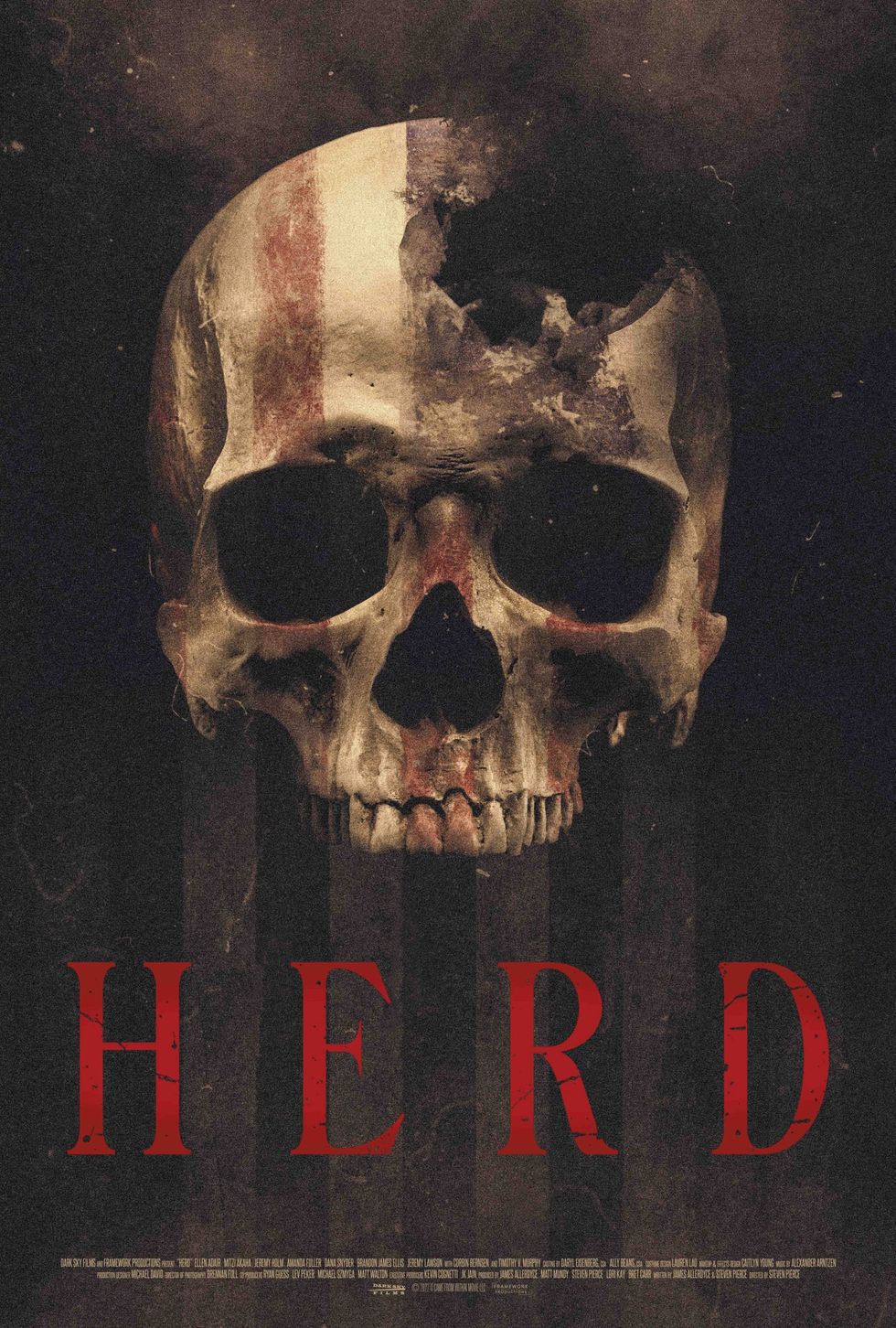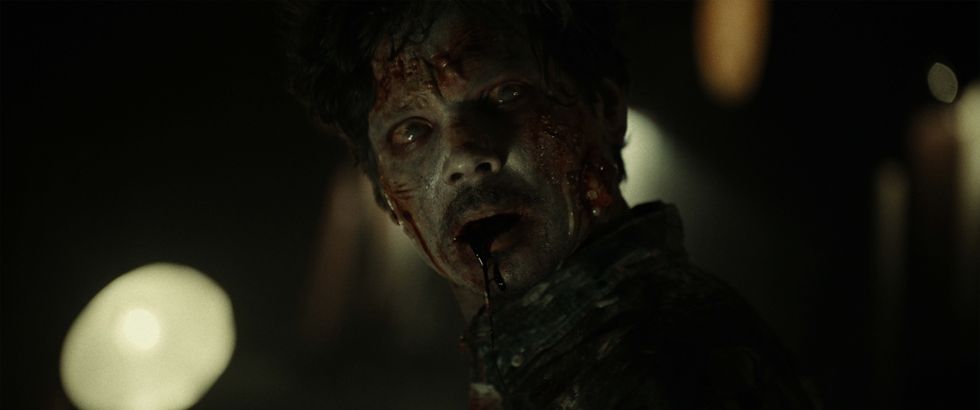
When one thinks of action film scores, themes to Indian Jones, Mission: Impossible, and Batman probably come to mind. In the horror genre, Halloween, Psycho, and Jaws are also probably the most recognizable. Each of these genres has unique sounding characteristics that are used to either create fear/uneasiness or to raise adrenaline levels.
Musically, what happens when a film falls in both the action and horror genres? Composer Alexander Arntzen can speak on this topic, as his latest film, Herd, falls into this cross-genre category.
Alexander says, “The key is to dial in what kind of horror you are working with and then, what kind of action you are trying to bring to that so that it doesn’t just become an “action movie”. It’s keeping and combining the visceral, raw horror elements, and marrying them with percussion instruments that are a little less clean around the edges to match the horror vibe.”
Alexander sat down with No Film School to go into more detail about scoring the soundtrack of the horror film, Herd.
HERD – Official Movie Trailer (2023)
youtu.be
No Film School: How did you first hear about Herd?
Alexander Arntzen: I first “heard” about Herd in July of 2021 on IMDb Pro. At that time, it was still called It Came From Within. I stayed in touch with the team back and forth via email until the summer of 2022 when they finally were ready for scoring. I did a demo and got the gig!
NFS: Can you talk about working with director Steven Pierce? Did he have a very clear understanding of how he wanted the score to sound?
Arntzen: Steven was great to work with! He very much had a clear idea of what he wanted to accomplish with the score. So much of our time was spent dialing in the tension and being very careful with how to support, but not overwhelm the scenes that were dialogue-heavy. The actors did such a great job with their performances that we didn’t want to step on their toes. Then, when the action scenes happened, we really tried to amp up the adrenaline of those scenes in the exact opposite fashion for maximum effect!
NFS: Has there been a new piece of equipment or instrument that you have discovered recently that you used in Herd? If not, what programs/equipment do you frequently use?
Arntzen: I can’t say I used any new overall sample libraries or synths, but I did discover new wicked and peculiar-sounding patches in Omnisphere that really took the score to the next level. I also got to work with Gretchen Bloom, a wonderfully talented cello player to record key scenes in the film as well. Overall, I have used Logic Pro as my main DAW since I started scoring films.
 ‘Herd’ official posterCredit: Dark Sky Films
‘Herd’ official posterCredit: Dark Sky Films
NFS: What does your scoring process look like?
Arntzen: My scoring process begins with spotting the film with the director and producing team. From there, I’d start scoring the most important cues first to build the most important themes and sounds that I wanted to use throughout. From there, it’s sending passes of the score to the filmmakers for feedback and just going back and forth until we’ve arrived at a score that we’re all happy and proud of.
NFS: There is so much content being produced these days, how do you keep your scores sounding new and fresh?
Arntzen: That’s always a constant battle for sure. I think it’s twofold. Firstly, I always want to create original and fresh-sounding music for the films I score. Not only because it’s the right and creatively most interesting thing to do, but selfishly, if I didn’t, I’d grow rather bored with the process of film scoring altogether. Secondly, a lot of that can also fall on who I’m collaborating with. If we are aligned to make something original, then that’s the mandate, and anything less won’t do!
NFS: You have worked in the horror genre before. How was Herd different from some of the other horror films you have worked on?
Arntzen: I think Herd was different than other horror genres that I’ve worked on for a few reasons. First would be the location of the film, which is in a rural setting. So we wanted to score to feel more grounded and earthy. Many of my other horror films had a tech or social media slant to them, whereas this was far more grounded and isolated from the modern world. This gravitated me to using far less electronic-sounding instruments and going more acoustic overall with strings and guitars.
 ‘Herd’Credit: Dark Sky Films
‘Herd’Credit: Dark Sky Films
NFS: Herd is both an action and horror film. Typically, those two genres have very different sounding scores. How did you approach Herd knowing this? What was key to combining these two different styles into one cohesive sound?
Arntzen: I love combining unusual sounds and bringing genres together, so this part of working on Herd was a treat! Horror and action have some things in common in terms of amping up the adrenaline and nerves in the audience. The key is to dial in what kind of horror you are working with, in this case, zombies. Then, what kind of action you are trying to bring to that so that it doesn’t just become an “action movie.” It’s keeping and combining the visceral, raw horror elements, and marrying them with percussion instruments that are a little less clean around the edges to match the horror vibe. Plus, if you add other elements like synch pulses, dirty them up. Since at its core Herd is actually a heightened drama that happens to have zombies and warring militias as the major backdrop, lean into that. This isn’t an old-school war movie. Or simply a zombie flick. It’s chaos! So make the music messy and disjointed sometimes, which as a bonus, will make things sound even scarier!
NFS: Herd has a purposefully rustic, rural, & raw sound. How did you get this desired sound?
Arntzen: Glad you noticed! That was the desired effect. By purposely choosing samples that had a little more edge and grit in them. Rather than using super clean and over-produced sample libraries, I chose patches that had longer sustains and had more control when it came to making them sound more eerie and twisted. Also, getting Gretchen, the cellist, involved really upped the production value. One cue in particular, I had her improvise over a simple chord progression and she used open fifths and fours as part of her solo to really give it a rougher, melancholic, country feel to the overall score.
 ‘Herd’Credit: Dark Sky Films
‘Herd’Credit: Dark Sky Films
NFS: As mentioned earlier, Herd is not only a horror film but also categorized in the action genre. Action films tend to have a lot going on in them, did you work closely with the sound designer on Herd?
Arntzen: The timeline for scoring Herd was very quick. So unfortunately, I didn’t have any time to work closely with the sound designer on this one. They were also based in Atlanta, [GA] so that made it more challenging too. Gratefully, the overall producing team was great and relaying everything that was needed for them to do a great job on their end once I sent them all the stems. Also, I was able to give feedback on the music mix and other levels near the end, which is always a big benefit to make sure everything is balanced well in the mix.
NFS: Herd has a large zombie element to it. Did you give the zombies a particular theme? What is key when trying to make a zombie more frightening, musically?
Arntzen: It is indeed. I can’t say the zombies were given an exact leitmotif, but there was an overall sound palette that I tried to use when they were on screen. Those were the moments where the score would be the most visceral, atonal, and raw overall. I wanted the audience not just to SEE that there were zombies but HEAR their presence as they approached our unsuspecting characters. I wanted you to feel like the bottom dropped out in your stomach when they were on screen. Hopefully, that came across!
You can learn more about Alexander Arntzen here.
Alexander’s Herd album is available here:
 Alexander Arntzen on Apple Music
Alexander Arntzen on Apple Music
music.apple.com
Author: Jason Hellerman
This article comes from No Film School and can be read on the original site.
